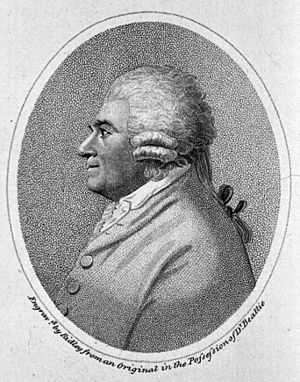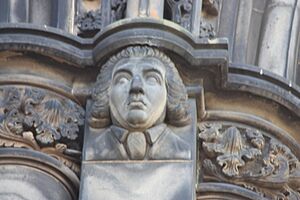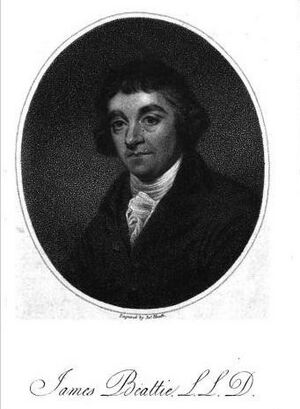James Beattie (poet) facts for kids
Quick facts for kids
James Beattie
|
|
|---|---|
 |
|
| Born | 25 October 1735 |
| Died | 18 August 1803 (aged 67) |
| Nationality | Scottish |
| Alma mater | University of Aberdeen |
| School | Scottish Common Sense Realism |

James Beattie (born October 25, 1735 – died August 18, 1803) was a Scottish poet, moralist, and philosopher. He is best known for his poetry and for speaking out against slavery.
Contents
Who Was James Beattie?
James Beattie was born in a place called Laurencekirk in Scotland. His father was a shopkeeper and a small farmer. James went to Marischal College, which is now part of the University of Aberdeen, and finished his studies in 1753.
Early Career and Teaching
In 1753, James Beattie started working as a schoolmaster in the town of Fordoun. A few years later, in 1758, he became an usher (which is like an assistant teacher) at the grammar school in Aberdeen.
In 1760, something surprising happened. He was chosen to be a Professor of Moral Philosophy at Marischal College. This happened because his good friend, Robert Arbuthnot, helped him get the job.
Beattie's Famous Works and Ideas
James Beattie wrote many important works during his life. His writings helped him become very well-known.
Poetry and Philosophy
In 1761, he published a book of poems called The Judgment of Paris. This book started to get him noticed. But the two works that made him truly famous were an essay and a long poem.
His essay was titled An Essay on the Nature and Immutability of Truth. It was written to argue against the ideas of another famous philosopher, David Hume. This essay was a huge success right away! It even led to Beattie meeting the King and receiving a special payment of £200 a year. He also earned a special degree called an LL.D. from Oxford University.
His most famous poem was The Minstrel. The first part came out in 1771, and the second part in 1774. This poem is what many people remember him for today. Even the famous writer Samuel Johnson praised it. The Minstrel is known for its beautiful descriptions of nature and feelings.
Fighting Against Slavery
James Beattie was a strong voice against slavery. He wrote about this important topic in his Essay on the Nature and Immutability of Truth (1770). He also discussed it in his book Elements of Moral Science (1790–93).
He used the example of a woman named Dido Elizabeth Belle to show that black people were just as smart and capable as anyone else. Dido Belle was a mixed-race woman who lived in England and was educated. Beattie used her story to argue that race did not affect a person's intelligence.
Music and Societies
Besides writing, James Beattie loved music. He played the cello and was part of the Aberdeen Musical Society. He also wrote about music in his essay On Poetry and Music, which was published in 1776.
In 1783, Beattie helped start the Royal Society of Edinburgh, which is a famous group for thinkers and scientists in Scotland. He was also chosen to be a member of the American Philosophical Society in 1786.
Later Life and Recognition
James Beattie faced many sad times in his later years. His wife became ill, and both of his promising young sons passed away. These difficulties greatly affected his health and happiness.
He stopped his teaching duties at Marischal College in 1797. He became sick with rheumatism and later had a stroke. James Beattie died in Aberdeen in 1803 and is buried there.
How He is Remembered
Today, James Beattie is mostly remembered for his beautiful poetry and for his strong stand against slavery. While some of his philosophical ideas have been debated by later thinkers, his impact on literature and his fight for human rights are still recognized.
He is one of sixteen Scottish poets and writers shown on the Scott Monument in Edinburgh. This monument is a tall tower dedicated to the writer Sir Walter Scott.
Works by James Beattie
Here are some of the books and poems James Beattie wrote:
- Original Poems and Translations (1760)
- The Judgement of Paris (1765)
- An Essay on the Nature and Immutability of Truth (1770)
- The Minstrel; or, The Progress of Genius (two volumes, 1771 and 1774)
- Essays, on the nature and immutability of truth in opposition to sophistry and scepticism. On poetry and music as they affect the mind. On laughter and ludicrous composition. On the utility of classical learning (1776)
- Scoticisms, Arranged in Alphabetical Order, Designed to Correct Improprieties of Speech and Writing (1779)
- Dissertations Moral and Critical (1783)
- The Evidence of the Christian Religion Briefly and Plainly Stated (two volumes, 1786)
- Elements of Moral Science (two volumes, 1790–1793)
See also
 In Spanish: James Beattie (poeta) para niños
In Spanish: James Beattie (poeta) para niños
 | Charles R. Drew |
 | Benjamin Banneker |
 | Jane C. Wright |
 | Roger Arliner Young |


